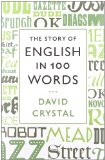 The Story of English in 100 Words
The Story of English in 100 Words
by David Crystal
St. Martin’s Press, New York, 2012. First published in Great Britain in 2011. 260 pages.
Starred Review
2012 Sonderbooks Stand-out: #8 Other Nonfiction
I confess; I took a little less than 100 days to read this book. But what fun it was! David Crystal takes 100 words, in chronological order based on when they became part of our language, and talks about how they became part of English, and what type of words they represent.
At the beginning, he gives “A Short History of English Words,” and you get a glimpse of why the book is so fascinating.
English is a vacuum-cleaner of a language, whose users suck in words from other languages whenever they encounter them. And because of the way English has travelled the world, courtesy of its soldiers, sailors, traders and civil servants, several hundred languages have contributed to its lexical character. Some 80 per cent of English vocabulary is not Germanic at all.
English is also a playful and innovative language, whose speakers love to use their imaginations in creating new vocabulary, and who are prepared to depart from tradition when coining words. Not all languages are like this. Some are characterised by speakers who try to stick rigidly to a single cultural tradition, resisting loanwords and trying to preserve a perceived notion of purity in their vocabulary (as with French and Icelandic). English speakers, for the most part, are quite the opposite. They delight in bending and breaking the rules when it comes to word creation. Shakespeare was one of the finest word-benders, showing everyone how to be daring in the use of words.
Here are some examples of the words whose origins and history he explores:
6. Street a Latin loan (9th century)
10. What an early exclamation (10th century)
14. Bridegroom a popular etymology (11th century)
40. Debt a spelling reform (16th century)
49. Fopdoodle a lost word (17th century)
56. Dilly-dally a reduplicating word (17th century)
67. Brunch a portmanteau word (19th century)
72. Ology suffix into word (19th century)
81. Doublespeak weasel words (20th century)
He even includes:
96. Sudoku a modern loan (21st century)
97. Muggle a fiction word (21st century)
99. Unfriend a new age (21st century)
100. Twittersphere future directions? (21st century)
I simply found this book fascinating, and packaged in nice small daily doses — a bit of interesting linguistic trivia to start my day. It would make a good calendar, except you’d have to shorten his essays about each word far too much. Hmmm. A blog would be better. He does give a few pages about each chosen word, and discusses many words of the same type.
I think those who will enjoy this book will know who they are from this description. (I’m thinking of you, little sister!)
Find this review on Sonderbooks at: www.sonderbooks.com/Nonfiction/story_of_english_in_100_words.html
Disclosure: I am an Amazon Affiliate, and will earn a small percentage if you order a book on Amazon after clicking through from my site.
Source: This review is based on a library book from the Fairfax County Public Library.
Disclaimer: I am a professional librarian, but I write the posts for my website and blogs entirely on my own time. The views expressed are solely my own, and in no way represent the official views of my employer or of any committee or group of which I am part.